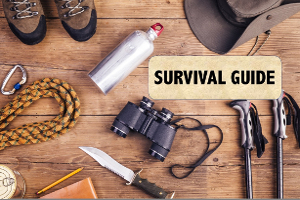A Building Product Manufacturer Survival Guide
- < An Interview with Dean from Noble Company
- > CRASH: Why Building Product Manufacturers Should Not Cut Prices
“Luck is a very thin wire between survival and disaster, and not many people can keep their balance on it,” said author Hunter Thompson. Building product manufacturers are in the survival business. With competitors closing in on all sides, manufacturers may go extinct if they fail to accomplish critical tasks. Customer service is one of the most significant factors that can affect a building product manufacturer’s bottom line and existence.
This survival guide won’t teach you how to survive a grizzly bear attack, start a fire in the rain, or giraffe proof your camp. Instead, we will explore how customer service can make or break a company. How can customer service affect your business? Author Jeffrey Fox outlined several benefits of customer service-
- Great customer service wins additional sales
- Excellent customer service generates positive word of mouth
- Good service helps reduce costs
- Strong customer service increases profits
Customer service affects the entire purchasing and post-purchase experience. Building product manufacturers face a very competitive marketplace. Many products in the AEC marketplace are considered a commodity. Many times, contractors, architects, designers, and other professionals may select the cheapest product to meet their needs. Building product manufacturers that operate on razor thin profit margins would be wise to offer the best customer service possible.
Be Prepared
“Good companies calculate the revenue value of a repeat customer, the reasonable lifetime value of a customer. They invest in customer service not for one transaction, but to get multiple subsequent sales. Calculate the lifetime value of your customers,” says author Jeffery Fox. Manufacturers should anticipate customer requirements and be ready to satisfy their needs. Be prepared for the unexpected.
Be Proactive
A significant part of customer service is quality. Customers define quality, not sellers. Architects, contractors, interior designers, and owners are the final judges of quality. Be proactive and find out what your customers want. Building product manufacturers that are successful typically produce high quality products that exceed their customer’s expectations.
Specification First Aid Kit
According to the Oxford English dictionary, a first aid kit is defined as “a small box containing items such as bandages, plasters, and antiseptic wipes for use in giving help to a sick or injured person until full medical treatment is available.” Building product manufacturers should have the necessary resources set up to assist design professionals with their specification efforts. If a designer runs into trouble on a project after hours, where are they going to turn if a manufacturer’s rep isn’t available to answer their questions. Let’s review what should be in every manufacturer’s Specification First Aid Kit or Tool Kit.
- Website- Building product manufacturers should have a user-friendly website that offers all the information a specifier would need. Guide specs, Safety data sheets, technical literature, LEED documentation, testing, certifications, and drawing details should be easily accessible on the website. Websites should avoid green-washing, overselling, and bad-mouthing competitors.
- AIA Continuing Education- Every product manufacturer should offer AIA continuing education. In a previous blog, we discussed why education is one of the most significant tools for getting specified. AIA continuing education courses build brand awareness, educate architects about your products, and increase opportunities. An online anytime CE course can educate designers, answer questions, and work for you after hours.
- LEED Documentation- Most manufacturers have guide specs and SDS on their website, however some manufacturers still don’t have LEED v4 product documentation available. Project teams working on LEED projects must know what LEED credits your products contribute to. Manufacturers that don’t offer LEED product data sheets do so at their own risk.
- Health Product Declaration (HPD)- The Health Product Declaration is the most requested specification document for LEED projects. The top AEC firms in the U.S. request HPDs from manufacturers. Firms such as Perkins+Will, Smith Group JJR, HKS, and ZGF encourage building product manufacturers to provide HPDs in order to be considered for product specification. Manufacturers who provide HPDs will be given preference over manufacturers that don't comply with these requests.
Building product manufacturers should be mindful of costs, product quality, customer service, communication with staff, and their values system. However, at the end of the day, customer service can be the deal breaker for many companies. Unhappy architects and contractors will go elsewhere if they are not satisfied with a manufacturer’s customer service. How does your company ensure the highest customer service?
For more information or to discuss the topic of this blog, please contact Brad Blank





